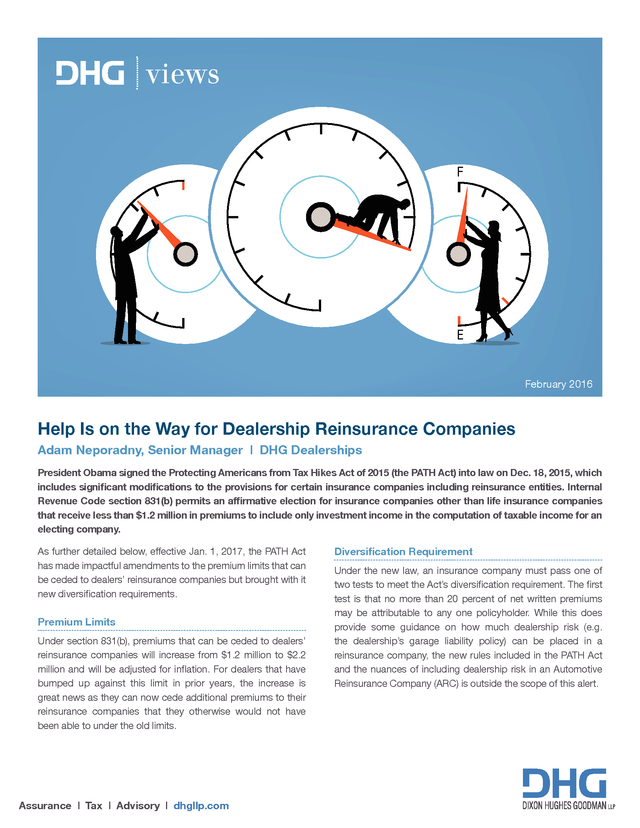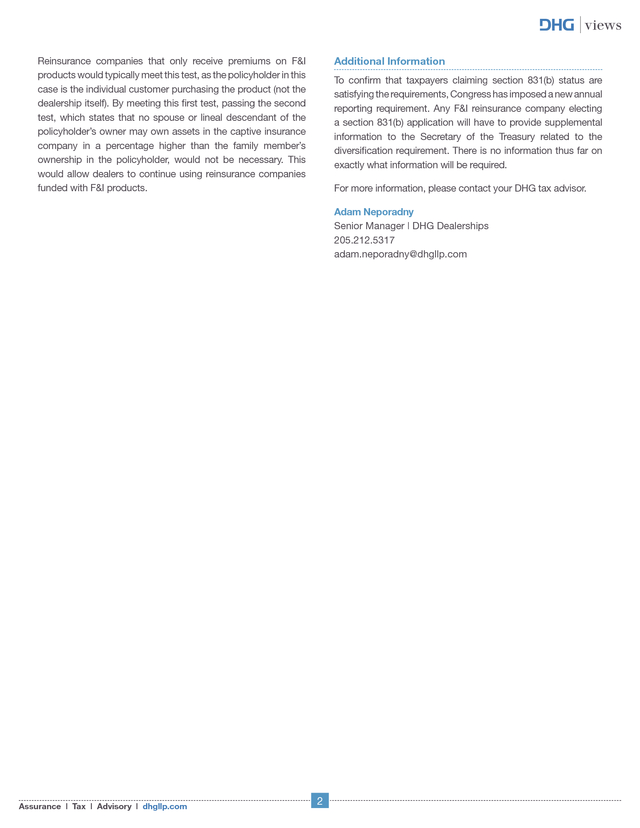Description
views
F
E
February 2016
Help Is on the Way for Dealership Reinsurance Companies
Adam Neporadny, Senior Manager | DHG Dealerships
President Obama signed the Protecting Americans from Tax Hikes Act of 2015 (the PATH Act) into law on Dec. 18, 2015, which
includes significant modifications to the provisions for certain insurance companies including reinsurance entities. Internal
Revenue Code section 831(b) permits an affirmative election for insurance companies other than life insurance companies
that receive less than $1.2 million in premiums to include only investment income in the computation of taxable income for an
electing company.
As further detailed below, effective Jan. 1, 2017, the PATH Act
has made impactful amendments to the premium limits that can
be ceded to dealers’ reinsurance companies but brought with it
new diversification requirements.
Premium Limits
Under section 831(b), premiums that can be ceded to dealers’
reinsurance companies will increase from $1.2 million to $2.2
million and will be adjusted for inflation.
For dealers that have bumped up against this limit in prior years, the increase is great news as they can now cede additional premiums to their reinsurance companies that they otherwise would not have been able to under the old limits. Assurance | Tax | Advisory | dhgllp.com Diversification Requirement Under the new law, an insurance company must pass one of two tests to meet the Act’s diversification requirement. The first test is that no more than 20 percent of net written premiums may be attributable to any one policyholder. While this does provide some guidance on how much dealership risk (e.g. the dealership’s garage liability policy) can be placed in a reinsurance company, the new rules included in the PATH Act and the nuances of including dealership risk in an Automotive Reinsurance Company (ARC) is outside the scope of this alert. .
views Additional Information Reinsurance companies that only receive premiums on F&I products would typically meet this test, as the policyholder in this case is the individual customer purchasing the product (not the dealership itself). By meeting this first test, passing the second test, which states that no spouse or lineal descendant of the policyholder’s owner may own assets in the captive insurance company in a percentage higher than the family member’s ownership in the policyholder, would not be necessary. This would allow dealers to continue using reinsurance companies funded with F&I products. To confirm that taxpayers claiming section 831(b) status are satisfying the requirements, Congress has imposed a new annual reporting requirement. Any F&I reinsurance company electing a section 831(b) application will have to provide supplemental information to the Secretary of the Treasury related to the diversification requirement.
There is no information thus far on exactly what information will be required. For more information, please contact your DHG tax advisor. Adam Neporadny Senior Manager | DHG Dealerships 205.212.5317 adam.neporadny@dhgllp.com Assurance | Tax | Advisory | dhgllp.com 2 .
For dealers that have bumped up against this limit in prior years, the increase is great news as they can now cede additional premiums to their reinsurance companies that they otherwise would not have been able to under the old limits. Assurance | Tax | Advisory | dhgllp.com Diversification Requirement Under the new law, an insurance company must pass one of two tests to meet the Act’s diversification requirement. The first test is that no more than 20 percent of net written premiums may be attributable to any one policyholder. While this does provide some guidance on how much dealership risk (e.g. the dealership’s garage liability policy) can be placed in a reinsurance company, the new rules included in the PATH Act and the nuances of including dealership risk in an Automotive Reinsurance Company (ARC) is outside the scope of this alert. .
views Additional Information Reinsurance companies that only receive premiums on F&I products would typically meet this test, as the policyholder in this case is the individual customer purchasing the product (not the dealership itself). By meeting this first test, passing the second test, which states that no spouse or lineal descendant of the policyholder’s owner may own assets in the captive insurance company in a percentage higher than the family member’s ownership in the policyholder, would not be necessary. This would allow dealers to continue using reinsurance companies funded with F&I products. To confirm that taxpayers claiming section 831(b) status are satisfying the requirements, Congress has imposed a new annual reporting requirement. Any F&I reinsurance company electing a section 831(b) application will have to provide supplemental information to the Secretary of the Treasury related to the diversification requirement.
There is no information thus far on exactly what information will be required. For more information, please contact your DHG tax advisor. Adam Neporadny Senior Manager | DHG Dealerships 205.212.5317 adam.neporadny@dhgllp.com Assurance | Tax | Advisory | dhgllp.com 2 .













